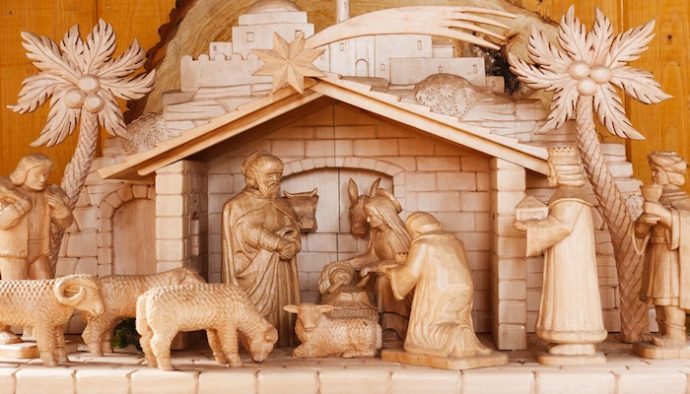“O Little Town of Bethlehem” has a wonderful story behind it.
It was Christmas Eve 1865 when Phillips Brooks was traveling on horseback between Jerusalem and Bethlehem. Reflecting on his journey, Brooks wrote:
“Before dark we rode out of town to the field where they say the shepherds saw the star. It is a fenced piece of ground with a cave in it, in which, strangely enough, they put the shepherds. . . . Somewhere in those fields we rode through, the shepherds must have been. As we passed, the shepherds were still ‘keeping watch over their flocks,’ or leading them home to fold.”
That night Brooks attended the Christmas Eve service in Constantine’s basilica which was built over the traditional site of Jesus’ birth. Apparently, the service lasted from 10 p.m. to 3 a.m. After all this, Brooks wrote song not for adults, but originally for the children who were part of the Sunday School at his parish at Holy Trinity Church in Philadelphia.
Isn’t that often the case? That which is good to teach children is excellent for teaching adults. And so it is with this song, which is not only sung, but also teaches us theologically. We are reminded in these lyrics that the birth of Jesus was not glamorous. It was not clean or pretty. It was the most ironic of births culminating in this backwater town.
The Christmas story is about the common being infused with the uncommon. The ordinary being invaded by the extraordinary. God born as a child. Every detail of the story drips with this theme – that this king is with us. One of us.
Listen to the words of the prophet that were written a thousand years before Jesus was born in Isaiah 53:
He grew up before him like a young plant
and like a root out of dry ground.
He didn’t have an impressive form
or majesty that we should look at him,
no appearance that we should desire him.
He was despised and rejected by men,
a man of suffering who knew what sickness was.
He was like someone people turned away from;
he was despised, and we didn’t value him.
Yet he himself bore our sicknesses,
and he carried our pains;
but we in turn regarded him stricken,
struck down by God, and afflicted.
But he was pierced because of our rebellion,
crushed because of our iniquities;
punishment for our peace was on him,
and we are healed by his wounds (Isaiah 53:2-5).
Think about it with me. Who was chosen to be the mother of this child? Not a queen. Not a person of prominence. An unremarkable, confused, and initially terrified 14-year-old girl. His father was not a man of great importance in the community – he was a stone mason, a common ordinary job.
As the ninth month approached, Mary and Joseph braced themselves for the reality that they would have to travel some 80 miles to a small town south of Jerusalem called Bethlehem, and that town would probably be where the child would be born. Nothing special there – just a community of shepherds and regular folks, nothing of notable size or importance except that it was the home of David centuries earlier. Those days were long gone by that point.
When the night finally came, there was certainly nothing special about that. No room at the inn, forced to find shelter in a cave with animals amidst the manure and the straw, laying the baby in a feeding trough. And who came to greet this great king? Shepherds. That was probably appropriate since they were the most common of common people, those lowest on the social ladder with no hope of changing their station in life.
Even the child’s name. Jesus. It means a lot to us, sure, but not to the people of that day. It had a great meaning – The Lord is Salvation. But it was strongly on the ordinary side. Half the kids in Hebrew school would be named Jesus. It would be the equivalent of being named “John” or “Joe” in this century.
And yet this is how God works. He infuses the ordinary with the extraordinary; the common with the uncommon. This child, who would not be extraordinarily tall, or handsome, or athletic, who would seem ordinary, is completely unique. And this child would be born into the most common of circumstances, a manger with everyday animals looking on, to completely ordinary parents, would redeem the world. Jesus comes into the ordinary and makes it extraordinary.
And He’s still doing it. He came into me, and into you, the most common of people, and made us uncommon. He made us children of God.
Yes, Bethlehem. You’re the right town. The right one for this kind of King.
Subscribe to MichaelKelley.co
Never miss a new post. Subscribe to receive these posts in your inbox and to receive information about new discipleship resources.






2 Comments